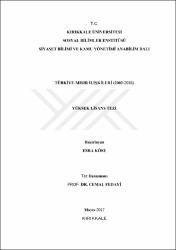| dc.contributor.advisor | Fedayi, Cemal | |
| dc.contributor.author | Köse, Esra | |
| dc.date.accessioned | 2021-01-16T18:58:13Z | |
| dc.date.available | 2021-01-16T18:58:13Z | |
| dc.date.issued | 2017 | |
| dc.identifier.uri | | |
| dc.identifier.uri | https://hdl.handle.net/20.500.12587/14980 | |
| dc.description | YÖK Tez ID: 477490 | en_US |
| dc.description.abstract | Osmanlı İmparatorluğu'nun son döneminden günümüze kadar geçen merhalede Türkiye-Mısır ilişkileri inişli çıkışlı bir yapıya haiz olmuştur. Bunun en önemli göstergesi, özellikle Cumhuriyet dönemi Türkiye'sinin ulus-devlet inşasını tamamlama süreci, Batılılaşma adına bir dizi reformların gerçekleştirilmesi ve laiklik anlayışının benimsenmesi gibi bir takım sebeplerle Ortadoğu'dan uzaklaşan Batı'ya yakınlaşan bir politika izlenmesiydi. Bu durum Mısır ile olan ilişkilere de yansımış ve ilişkilerde bir soğukluğa neden olmuştur. Ancak Türkiye, Arap-İsrail Savaşları'nda Arapları destekleyen bir tutum sergileyerek ilişkileri düzeltmeye çabalasa da bu Arap dünyası tarafından Kıbrıs meselesine pragmatik bir çözüm arayışı olarak algılandığı için ilişkiler pek yol katedememiştir. 1990'lı ve 2000'li yıllarda terörizm gibi sorunların baş göstermesi ile bu durumdan etkilenen ve yaşanan hadiselere sessiz kalamayacağı inancını taşıyan Türkiye, dış politikasında proaktif bir şekilde hareket ederek yüzünü Batı'dan Ortadoğu'ya çeviren bir tutum sergilemiştir. Türkiye'nin dış politikasında Ortadoğu'ya yönelişi, Arap ülkeleri tarafından memnuniyetle karşılanmış ve ilişkiler karşılıklı ziyaretlere dönüşerek ivme kazanmıştır. Ayrıca 2011 Mısır Devrimi'ne Türkiye'nin destek vermesi ve demokrasiyi savunuşu, Mısır halkının Türkiye'ye olan sempatisini arttırmış ve 2012 yılında iktidara gelen Müslüman Kardeşler döneminde Türkiye-Mısır ilişkileri, atın çağını yaşamıştır. Ancak çok geçmeden 2013 yılında askeri darbe ile Mısır halkının demokratik duygularına ket vurulması, adeta devrim öncesindeki yılları geri çağırmıştır. Türkiye'nin Mısır'daki askeri darbeye sert tavrı karşısında Türkiye-Mısır ilişkileri gerilmiştir. Anahtar Kelimeler: Ortadoğu, Mısır, Devrim, Askeri Darbe, Demokrasi, Hukuk, Özgürlük, Arap Baharı | en_US |
| dc.description.abstract | The Turkish-Egyptian relations in continuous stage from the Ottoman Empire's the last period until the present day had a bumpy structure. The most important indicator of this, especially, with a number of reasons such as the process of completing the nation-state construction of Turkey in the Republican period, the implementation of a series of reforms in the name of Westernization, and the adoption of secularism, followed a policy that converged with the West, which had been moving away from the Middle East. This situation was also reflected in the association with Egypt and caused a coldness in relations. However, although Turkey sought to improve relations by exhibiting an attitude supporting the Arabs in the Arab-Israeli Wars, much progress has not been made in the relations since this Arab world perceived it as a pursuit of a pragmatic solution seeking on the Cyprus issue. With emergence of the problems such as terrorism in the years of 1990s and 2000s, Turkey, affected from this situation and cannot remain silent to occurrences that have been faced has showed an attitude in which it has turned its face to the West by acting proactively in its foreign policy. The orientation towards the Middle East in Turkey's foreign policy has been welcomed by Arab countries and has gained momentum by transforming relations into reciprocal visits. In addition, Turkey's support for the 2011 Egyptian Revolution and its advocacy of democracy have increased the sympathy of the Egyptian people to Turkey and during the Muslim Brotherhood, which came to power in 2012, Turkey-Egypt relations underwent the golden age. However, hindering the democratic feelings of the Egyptian people with the military coup in 2013 soon has almost recalled to the years prior to the revolution. Turkish-Egyptian relations have been strained in the face of Turkey's harsh attitude towards the military coup in Egypt. Keywords: Middle East, Egypt, Revolution, Military Coup, Democracy, Law, Freedom, The Arab Spring | en_US |
| dc.language.iso | tur | en_US |
| dc.publisher | Kırıkkale Üniversitesi | en_US |
| dc.rights | info:eu-repo/semantics/openAccess | en_US |
| dc.subject | Uluslararası İlişkiler | en_US |
| dc.subject | International Relations | en_US |
| dc.subject | | en_US |
| dc.subject | | en_US |
| dc.subject | | en_US |
| dc.subject | | en_US |
| dc.subject | | en_US |
| dc.subject | | en_US |
| dc.subject | | en_US |
| dc.subject | | en_US |
| dc.title | Türkiye-Mısır ilişkileri (2002-2016) | en_US |
| dc.title.alternative | Turkey-Egypt relations (2002-2016) | en_US |
| dc.type | masterThesis | en_US |
| dc.contributor.department | KKÜ, Sosyal Bilimler Enstitüsü, Siyaset Bilimi ve Kamu Yönetimi Anabilim Dalı | en_US |
| dc.identifier.startpage | 1 | en_US |
| dc.identifier.endpage | 272 | en_US |
| dc.relation.publicationcategory | Tez | en_US |
















